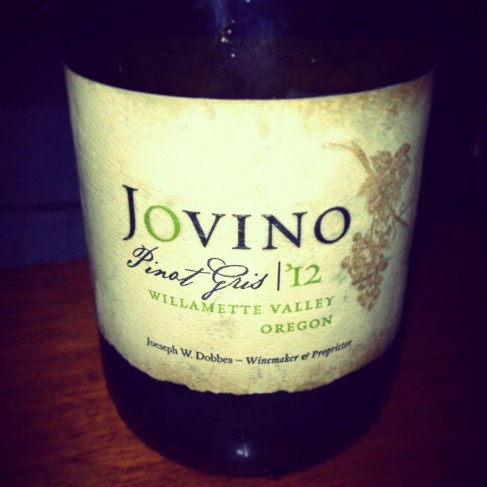 This Pinot Gris is such a refreshing start to spring. The wet stone minerality is the first aroma to jump out of the glass, followed by stone fruits such as white peach and apricot. There is a subtle hint of white flowers, making the wine floral, yet not perfumed. You can taste the youth of this wine by the very slight effervescence. This will blow off in time, but for now, it only enhances this wine’s already zippy acidity.
This Pinot Gris is such a refreshing start to spring. The wet stone minerality is the first aroma to jump out of the glass, followed by stone fruits such as white peach and apricot. There is a subtle hint of white flowers, making the wine floral, yet not perfumed. You can taste the youth of this wine by the very slight effervescence. This will blow off in time, but for now, it only enhances this wine’s already zippy acidity.
Pinot Gris is a European grape, more commonly known by its Italian alias, Pinot Grigio. In Italy, Pinot Grigio tends to have more acidity, less body, and shy fruit aromas. In northern France, the grape, Pinot Gris, has such a bold, rich personality, that you may not think they share the same DNA. The beautiful thing about Oregon is that it is capable of finding a middle ground between these two distinctly different styles, featuring the inherent characteristics of Pinot Gris, while appealing to all palates. However, don’t think every Pinot Gris from Oregon achieves this. Some producers don’t succeed, producing one of two styles: one style reminiscent of Italian Pinot Grigios, high in acid, but lacking character, or a bold, rich style of wine that lacks acidity, becoming a flabby inferior substitute to the Alsatian great white.
Finding the perfect balance is where winemaker extraordinaire, Joe Dobbes, comes in. He is a household name in Oregon, by wine virtue, not by overexposure. It is not surprising that he excels in creating honest, balanced wines. The Joe Dobbes and Dobbes Family Estate believe and invest in a sustainable farming culture. They do this because they believe sustainable farming creates a cleaner, more honest wine, while benefitting the land and leaving it better than it was before. Their winemaking facility was the first in Oregon to receive their LIVE (Low Input Viticulture and Enology) certification, and also has their OCSW (Oregon Certified Sustainable Wines) certification. It is valuable to be recognized for their eco-friendly practices, but what’s most important to the Dobbes Family is that they are engaging in these practices for the greater good. Not only does sustainable farming enhance the fruit produced on the land, and the land itself, it provides a viable economy for the community of people involved in this labor of love. I can assure you that this holistic approach absolutely translates to the glass.
By Contributing Writer, Katie Kelly